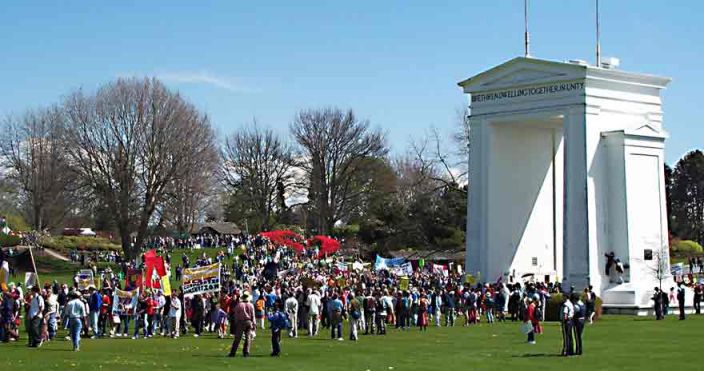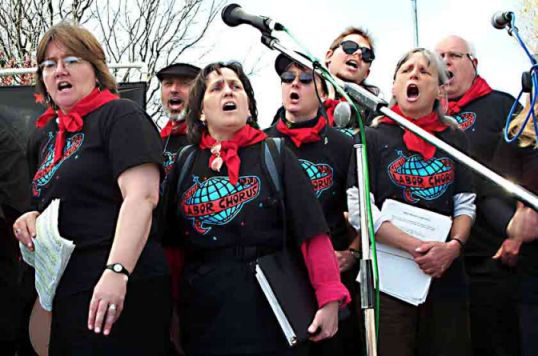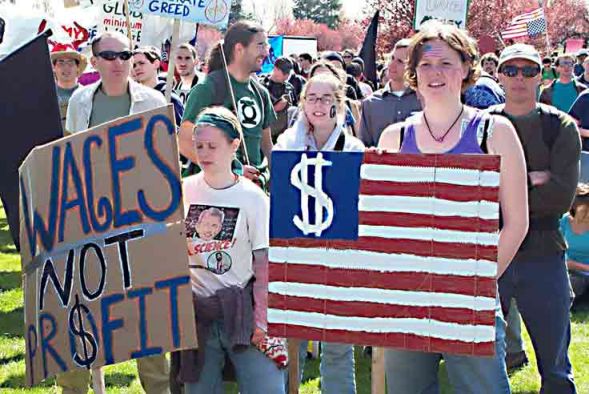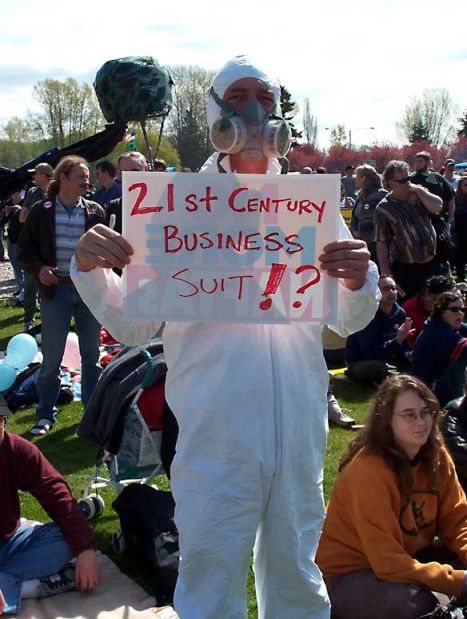|
|
|
|||||||||||||



|
Dear George: On April 22, 2001 all the nations of the Western Hemisphere, excluding Cuba, signed a rough draft of the FTAA (Free Trade Area of the Americas) treaty. The draft consisted of "mostly bracketed material that has yet to be agreed to" (Tony Smith, Seattle Times, April 23, 2001) but embodied a commitment to forge a treaty which would govern trade relationships in this hemisphere by Jan 1, 2005. Throughout the Western Hemisphere and in many other places people demonstrated to show their concern over the potential harm an agreement could cause. In Quebec, speaking from within the conference, called The Summit of the Americas, at which the draft was signed Brazilian President Fernando Henrique Cardoso said the demonstrators are "motivated by the fear of a trade agreement without a human face." (Robin Wright, Seattle Times, April 23, 2001). I presume most people have seen images from the protests in Quebec. Especially striking is the picture that was on both the front pages of our daily newspapers here, that of three protesters surrounded by police in riot gear and engulfed in a vast cloud of tear gas. It looked to me like a staging of Les Miserabe in a contemporary setting. But, as Alexis Zigler reported in the April issue of this magazine, the picture did not portray an isolated event. Alexis reports that police employed tear gas and chemical agents of greater strength throughout the protests. If you heard about our protests against the FTAA at the Peace Arch in Blaine, WA, it was likely in the inside pages of your newspaper. In contrast to the more than twenty thousand protesters in Quebec we had closer to four thousand (though local media reported only two thousand). In contrast to tear gas laden air, we had the crisp air of a Northwest spring, clear skies and a breathtaking view of Puget Sound. Though we had an episode of civil disobedience at the border at which eight people were arrested, it was accompanied by the artistry of sidewalk chalk and the musical beat of drums, not the military cadence of batons on shields. For me the event at The Peace Arch began on the Internet. I was amazed at all the links to anti-FTAA demonstrators I found at http://www.stopftaa.org/peacearch/ and have since found interesting coverage of the event at http://seattleindymedia.org. In addition, I was surprised at the excellent coverage of trade issues provided by Canadian broadcasting on CBC2. On Saturday morning my wife Linda and I started to drive on I-5 to Blaine from Seattle. As I have indicated, the weather was beautiful. We saw our northern Washington snow covered volcanoes, MT Baker and Glacier Peak, the sloughs in the vicinity of Everett, WA, an eagle paralleling the highway and lots of buses. There were school buses from Oregon, buses from Olympia Washington, and buses rented by various union locals in Seattle and by the King County Labor Council, all going to Blaine. We passed the long articulated city bus rented by our union local, Local 587 of the Amalgamated Transit Union, and honked and waved. We weren't on the bus because we were going to visit friends near Blaine after the demonstration. Arriving at the Peace Arch Park, I was pleasantly surprised that we did not have to park very far from the event. Nevertheless, the crowd pleasantly filled the area. There were placards that told of Jesus' displeasure with FTAA, there was a huge truck emblazoned with the TEAMSTER insignia, there were socialists, Radical Women, a number of Canadian labor unions and organizations with which I was not familiar, there were signs of unions present which are familiar on both sides of the border; there were large puppets and guys on stilts.
The prevailing mood in this diverse international crowd was "glad to see you". From the stage there were Radical Women Cheerleaders, who presented their anti-fascist message in cheers and movements. There were The Raging Grannies, women dressed in "eye catching hats and wild 'granny' clothes", who sang satirical songs. Solidarity Notes Labor Chorus, from Vancouver BC, and the Seattle Labor Chorus also sang. Rebel Voices , a musical duo, comprised of Janet Stecher and Susan Lewis performed with their characteristic intention and intensity. Canadian Punk Rocker Joe Keithley, who is running on the Green Party ticket for the BC legislature, sang with an earthy energy. And, though I may have missed others, I want to mention Francisco Herrera. The beautiful songs he sang in Spanish gave voice and presence to the concerns of the Latin-American people and, of course, of humanity in general.
Above I have given references that probably describe the demonstration in its totality better than I can. Since the Seattle Labor Chorus, of which I am a part, performed both in combination with Solidarity Notes Labor Chorus and alone, much of my time was dedicated to rehearsal and other activities necessary for performance preparation. Regrettably, I did not see the shutdown at the border. I am content to share with you my small piece of the pie - my encounters with a few of the remarkable people who I saw at Peace Arch Park. I don't know anything about Earl Peach, the musical director of Vancouver, BC's Solidarity Notes Labor Chorus, except that he has an amazing vocal range and that he viscerally communicates his enthusiasm for music. The Seattle Labor Chorus and his chorus rehearsed together at Peace Arch Park. When he conducted us, he performed a delightful and improbable dance. In zero g his motions would have resulted in elegant flights and fanciful arabesques. Our own director, Janet Stecher is better acquainted with gravity. When she conducts us it's as if she were playing a large rusticated organ, tuning and returning each rank. She supports us. She exhorts us. She restrains us. And, somehow, the meaning flows. Finally, I want to share with you the pleasure of meeting two of the many speakers who spoke at the Peace Arch. It is one of Texas' saving graces that it produces people like John Goodman. He might not have the gift of expressing the truly outrageous like Jim Hightower, or the grotesquely comical like Molly Ivans (and I could go on and on in this listing) but I wouldn't be surprised to see him sitting with them at Schultz's Beer Garden in Austin, TX. Presently, however, I believe he resides in Spokane, WA where he is a member of the Steelworker's Union. His speech was a populist stem winder delivered with conviction and courtesy. He urged us to stand up for the principles of our life. "It is time to assert the Sovereignty of the People against the Sovereignty of the Corporations." he said. He gave examples of people who took a stand such as Julia Butterfly Hill who defended ancient redwood trees by staying in a tree named Luna for two years, and the 4,200 people who were arrested at Fort Bennings, GA while protesting The School of the Americas, many of whose alumni are implicated with human rights abuses in Latin America. Dr. Robert Jefferies, pastor of the New Hope Baptist Church in Seattle, WA, is one of those people who make you feel smart just by listening to them. He has a varied rhetorical style. He began his speech to us with argument, transitioned with brilliant quotes, excoriated with incisive listing, took time to acknowledge our inadequacies and point us toward our better selves, and once again used great pithy quotes to remind us of our connections with justice in the world and with the struggles in which we are mutually engaged. Unfortunately, the speed of my hand was no match for the fluency of Dr. Jefferies' tongue. Having received my BA in American Studies, I was delighted by his comparison of modern trade agreements and institutions to the British laws dubbed by American Colonists as the Intolerable Acts. These Intolerable Acts were one of the main causes of the Revolutionary War. I could not write Dr. Jefferies comparisons quickly enough. But the issues of autocracy versus democracy are as alive today as when the Declaration of Independence was written. You don't have to believe in malevolent black helicopters or that the Club of Rome is guilty of conspiracies to be suspicious of the anti-democratic biases of many international agreements and organizations. Dr. Jefferies used two quotes which would be appropriate to review daily. One is by Thomas Paine, "Tyranny, like hell, is not easily defeated. Yet we have this consolation with us, that the harder the conflict, the more glorious the victory." The other is by Martin Luther King, "We are sick and tired of being sick and tired."
"A Bit of Blaine" - by Linda Anderson I took my folding bicycle to the anti-FTAA rally at the US/Canada Peace Arch. After several hours of speeches, I decided to explore this small border town of Blaine, WA. It was a beautiful day and the setting was idyllic. I rode out from Peace Arch Park on a quiet street along the salt-water bay. Curious to see more of the town, I doubled back through a neighborhood full of a variety of houses with large beautiful yards, and several churches, until I came to the business district. A large bank, a few shops, and the city hall were clustered on a small grid of deserted streets. For a Saturday afternoon, not much was happening. The Blackberry Inn Coffee Cafe looked interesting. I decided to get some coffee and read a little. As I walked into the charming cafe, a large table surrounded by the family of the proprietors gave me a hearty welcome. I ordered some blackberry cobbler and ate it outside. When I came in for a coffee refill, I asked the family what they thought of the demonstration. Then I asked about Blaine, a town of 2 to 3 thousand people. Mr. Hawkins explained that, apart from government jobs, Blaine once had a logging and fishing economy. As those resources grew scarce and heavily regulated, Canadian shoppers filled in the gap for a time. Now the weak Canadian dollar, and a supermall to the south had made the tourist trade fall off too. Charlie Hawkins was a fisherman for 30 years; now he and his wife Marsha run this friendly cafe. They had opened specially on Saturday hoping to get some business from the protesters. Unfortunately for the Hawkinses, the protesters struck me as the tabouli-and-sandwich-from-home crowd. The first thing Charlie Hawkins told me was that he supported the protest because he didn't want to see more jobs lost. And he appreciated the need for environmental regulations - after all, he'd seen the fish and crabs severely depleted, by Native Americans as well as sports and commercial fishers when regulation was inadequate. But Mr. Hawkins made it clear he was not speaking for all Blaine residents. According to him, they're about as divided on free trade issues as the rest of the country. Later, I came back to the Blackberry and brought my in-laws who were at the rally. We all enjoyed the hospitality and blackberry cobbler. My brother-and sister-in-law discussed how outraged they were at the huge number of police at the rally. The behavior of some police they witnessed did sound high-handed, although the ones I encountered seemed pretty friendly and relaxed. Charlie and Marsha Hawkins had already told me how much they appreciated that police were willing to come from all the small towns around there on their days off to help police the rally. Conclusion On May 18, 1952, Paul Robeson sang at a concert at the Peace Arch in order to support the Mine, Mill and Smelter Worker's Union of British Columbia. Although no passport was required, Robeson had been denied permission by the U. S. State Department to enter Canada. Subsequently, he performed at three more concerts at the arch between 1952 and 1955. His life is a testimony to efforts to redress an essential weakness in the progressive movement of our country - the lack of a total and unequivocal commitment by US labor (and labor around the world) to end racism. It is a struggle in which Martin Luther King Jr. was engaged when he was murdered in Memphis, Tennessee. It is a struggle which continues today. There are two more links in the chain of labor solidarity which are now being forged. One is a movement for a sustainable environment. In this context, it is encouraging that both John Goodman, the steelworker, and Charlie Hawkins, the former fisherman, recognize the need to respect the environment. It should come as no surprise that people who are involved in environmentally sensitive industries have a lot to teach us about this subject. The other link is the vexing problem of how to build solidarity with all the peoples of the earth. The area in which the Peace Arch rally and stage program was held lies behind the bluff one must descend to visit the Peace Arch. The Seattle Labor Chorus was the last act on stage. When we finished singing I joined the back of the march down to the Peace Arch itself. Just before the descent, at the brink of the hill, I got my first look at the Peace Arch that day. There the grand arch stood on a vast plain with the ocean beyond it. Inscribed on one side of it are the words "Children of a Common Mother," though not its original significance, for me, the words point toward our connection to the earth and to all humanity. A great circle of people were passing through the arch, up into Canada and returning to the United States. There were people in that crowd who had attended Paul Robeson's first concert here. There was a woman who had served in the Ambulance Brigade during Spanish Civil War. There were veterans of the Civil Rights Movement. There were youth who had passion and conviction. There were gays and lesbians, Christians and Marxists, Latin Americans and Chicanos African-Americans and Native Americans (the border an irony to them), Canadians and Americans and more - each of them pursuing their separate struggles and each, hopefully, receiving support from everyone there. Step by step, struggle by struggle, as we come to appreciate the precious uniqueness of each person, a new creative capability is born within us. So, is it so strange to say that a pleasant day in Blaine, WA may have as profound an effect on human consciousness as the beating of the wing of that hypothetical butterfly might have on the weather of the world? - just a thought. Craig Anderson (electronic mail, May 15, 2001).
PS. Perhaps I just can't throw anything away. But here is an interesting quote by Paul Robeson from his book Here I Stand: "This belief in the oneness of humankind, about which I have often spoken in concerts and elsewhere, has existed within me side by side with my deep attachment to the cause of my own race. Some people have seen a contradiction in this duality. I do not think however, that my sentiments are contradictory. I learned that there truly is a kinship among us all, a basis for mutual respect and brotherly love." Thank God that the homogeneous utopias envisioned in thought can never
become a reality. Walt Whitman was a greater seer than Karl Marx or Henry
Ford.
|




